This week’s blog post has two parts. First one is more personal and related to language and culture, and second one is more connected to this week assignment.
PART I
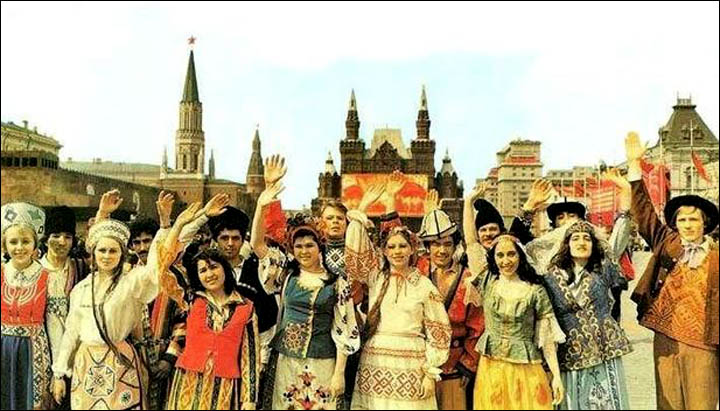
Growing up in the Soviet Union we took pride in being truly ‘multicultural’ (it is an American term; and I am using it not being able to find a better equivalent). In my school and among our neighbors and friends we had Uzbeks, Tajiks, Kazakhs, Russians, Ukrainians, Koreans, Greeks, Chechens, Georgians, Tatars, Armenians, Kalmyks. The common language that everyone used was, of course, Russian. The Soviet propaganda worked very well in “Russification” of the entire USSR.
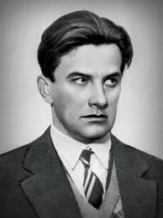
Vladimir Mayakovski, a Soviet proletariat poet wrote in his poem “Vladimir Ilyich Lenin:”
“I would have learned Russian just for the fact that Lenin spoke it.”
This quote was used as a great propaganda tool. We were all proud to be able to speak and use the the same language that Lenin spoke and used for writing his books.
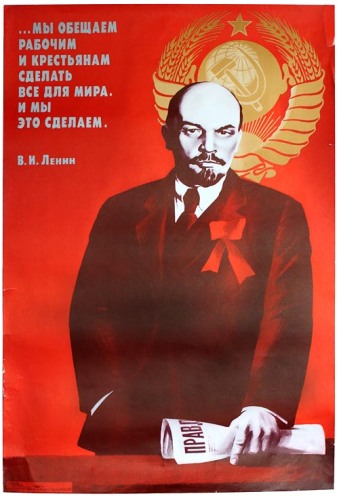
Soviet propaganda poster. The text above is a quote from Lenin “We promise to the workers and peasants to do everything for peace and we will.”
Using the periphery and center reference – the farther away people lived from the major cities, they used less Russian and more of their native language; and vice versa. In our family, my parents used Uzbek to converse with neighbors, Kazakh between themselves and Russian with me as we lived in a city. When we visited our relatives in rural areas, we used mostly Kazakh.
The Kazakh culture that my parents grew up in was instilled in our home. The children were taught to respect their elders, and were to address their parents and grandparents using ВЫ – formal (plural) “you” only, even when using Russian language. I could never imagine addressing my parents using ТЫ – an informal “you” as it would be considered a grave insult.
Interestingly enough, my best friend who was Russian, addressed her parents using informal “you” and we had these interesting conversations on how differently we perceived the usage of ВЫ/ТЫ addressing our parents. To her the informal “you” was an expression of closeness and family ties to one’s parents and the usage of formal “you” was an indication of as if being strangers with one’s own parents and therefore, inability to have a special family bond. To me, however, the usage of the formal ‘you’ was an expression of my respect and love for my parents; and it never stood in the way of having close relationship with my grandparents and my parents.
When going to the open air market, “bazar,” my mom often spoke Uzbek, addressing different salespeople as “auntie,” “uncle,” “older brother/older sister,” “younger brother/younger sister” depending on their age. And that is exactly the way Uzbek family members address each other in their own families. I found it fascinating that you could address people you don’t know as if they were your family members. Think about closeness of ties on different levels in a society.
Uzbek tradition of tea drinking with your close neighbors was our family tradition as well. We celebrated big family milestones with our relatives as well as our neighbors. I consider myself lucky growing up in an environment that was culturally and traditionally family oriented. People were friendly and hospitable because of their culture. And I mistakenly assumed that it was like that in any part of the USSR. However, when I visited Moscow and St. Petersburg in my early 20s, I encountered my first very big cultural shock with the seemingly cold Russian culture. On the brighter side, once you get to know Russian people, they are quite warm and hospitable. But that probably is the same everywhere.
BTW, the term”nationality” in Russia is not the same as it is in English. In America, one’s nationality is determined by citizenship. In Russia, a person’s nationality is different from his/her citizenship. Your nationality can be Ukrainian but you could be a citizen of Georgia.
PART II
To stay on the topic, I am writing on President Karimov’s applauded “multi-vector” diplomacy through which he is successfully able to maintain good relationship with the European Union, the United States (stationing US military base 2001-2005 and currently serving as one of the points in the US and NATO backed Northern Distribution Network), Russia and China (both members of Shanghai Cooperation Organization), maneuvering carefully and always looking out for the Uzbek interests.
(pictures above are Islam Karimov’s meetings with Vladimir Putin, Xi Jinping, John Kerry, Jose Manuel Barroso)
The EU and the US imposed sanctions on Uzbekistan based on human right abuses (following rejections of their inquiries for independent investigation of Andijon massacre of 2005) but the sanctions were gradually lifted due to the country’s important geostrategical position in the region resulting in better diplomatic relations and outcomes for each actor involved.
Uzbek leader keeps his distance with the immediate neighbors especially Kyrgyzstan and Tajikistan due to water, border and interethnic conflicts. However, he does not ignore them and looks for solutions, although indirectly “via multilateral or international engagement” (Karimov keeps bilateral relations with the global partners).
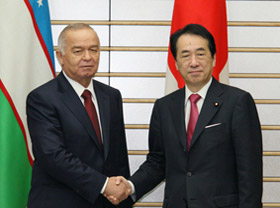
Uzbekistan also has good relationship with South Korea and Japan. Japan has pursued its own version of “Silk Road Diplomacy” toward Central Asia since 1997, focusing on “education, economic development, political reforms, as well as energy resources.”
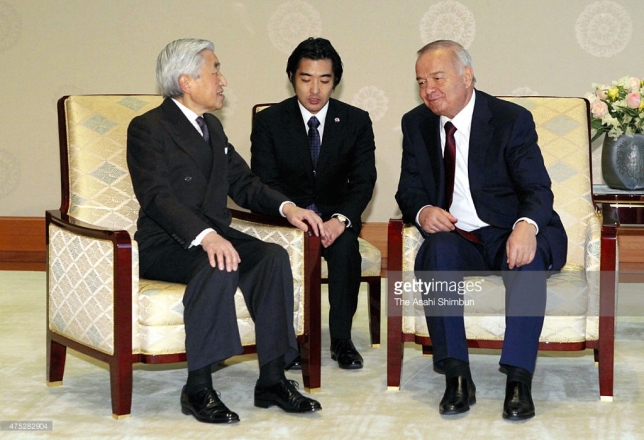
In the words of M K Bhadrakumar, former Indian ambassador to Uzbekistan, Karimov’s “multivector diplomacy” allows him to get ‘what he wants out of big powers like the U.S., Russia and China, without giving up its sovereignty in return” and that deserves a proper recognition. However, given the president’s age, what steps are being taken to groom the next person that succeeds him?
Sources:
Younkyoo Kim, Fabio Indeo, The new great game in Central Asia post 2014: The US “New Silk Road” strategy and Sino-Russian rivalry. Communist and Post-Communist Studies 46 (2013) 275-286. www.elsevier.com/locate/postcomstud
Umida Hashimova, East-West Diplomacy of the Uzbek President (February 17, 2011). The Jamestown Foundation, Eurasia Daily Monitor Volume: 8 Issue: 34 Retrieved from http://www.jamestown.org/single/?tx_ttnews%5Btt_news%5D=37524#.VsqVE_krLIU
Zabikhulla Saipov, Uzbekistan Seeks to Reinvigorate Its Diplomatic Clout in the Region (December 5, 2014). The Jamestown Foundation, Eurasia Daily Monitor Volume: 11 Issue 217. Retrieved from http://www.jamestown.org/programs/edm/single/?tx_ttnews%5Btt_news%5D=43167&tx_ttnews%5BbackPid%5D=27&cHash=9b8db1b9767574e772d4a8e902dd4b4a#.VsiwVfkrLIV
Pictures are from various internet sites and used here for non-commercial purposes





I read with great interest your comments about your personal experience in Russia with regard to language and culture – I find them to be fascinating!
I read your introduction as well as your most recent post as I know very little about Uzbekistan (the maps were very helpful!) Uzbekistan’s geographic location and history must lend itself to certain challenges. Interesting to note their top trading partners and Eastern influence in the region, both economically and culturally. I imagine that, due to ongoing human rights issues, the U.S. will continue to stipulate trade/interaction with the conformity to democratic values, which may drive them further East in their economic interests. I wonder what this could mean for the US’ ongoing interest in the Middle East, since Uzbekistan is an access point? It will be interesting to watch.
LikeLike
Hi Kelley! Thank you for the comment. Yes, I’m feeling the same about everyone’s blogs – it is as if taking a World Geography course focusing on specific case studies done by each student. I am grateful we can have such an experience and learn about the world and how it functions. To answer your question, I do not think Central Asian region will push out the West – they need the EU and the US to counterbalance the influence/pressure from Russia and China. Unfortunately, the region in general is not integrated enough (b/c of many factors) but if it was integrated, then it would be a whole different game in terms of the region’s strength and leverage.
LikeLike
Wow that was a very interesting read. I really enjoyed Part I as you broke down a lot of culture and customs through your own experience. The part about Uzbekistan having allies in the EU, US, and Asia was very shocking as well, as it is not a very well-known country. Well done!
LikeLike
Thanks Sherika! I don’t know much about culture in “academic” sense but thought it is interesting to see its interconnectedness with languages and tradition.
As for foreign relations – diplomacy is really interesting, certain things can “make or break” the relationship be it West or East.
LikeLike
I must say that I was really interested in your post on several different levels.
The first connection: I am currently reading an interesting book call “Iron Curtain” by Anne Applebaum which is basically a chronological record of how the USSR influenced its satellite countries and other regions. Your pieces about Lenin and the multiculturalism of the USSR I think often get overlooked. People assume that the USA is the only “melting pot” when that simply is not the case. That part tied into my own personal reading.
The second connection: I also had a connection to your blurb about how in your dialect of Russian you make a strong distinction between the formal and informal you. My family is Argentine and I have noticed in the USA that many Spanish speaking countries do not follow that rule. My mother is the same way where if I addressed really anyone except my brother, sister, or friend as “tu” verse “usted” I would have a lecture coming my way! It is the same thing with our use of the word “vos” which is another word for you. They use it in Spain and some parts of Colombia but most of Spanish speaking world does not. I related very much so despite my knowledge of Russian being all of 10 words and counting.
This was a fantastic post!
LikeLike
Thank you, Zach! I will look for the book – looks like an interesting read. Yes, I heard about Spanish usage of formal and informal “you.” It seems that English language is the only one that has the same singular and plural form of “you” which can be interpreted both ways, either a very polite or too informal depending on the situation.
If i may comment on the “melting pot,” the US is definitely more tolerant and promotes equality better than it was in the former USSR. With the “Russification” policy, Russian language was put on a pedestal, automatically making it superior to others.
LikeLiked by 1 person
Thank you for sharing your experience in Russia. Many people still have perception that Russia is the West enemy because all the fallouts of Cold War and the reality today is about partnership in several areas such as public safety or doing business. The war on terrorism is one of those issues services from both sides deal and economically Russia supply gas to European Union. Beyond that, this country is an enormous cultural land especially in Pittsburgh and the world needs Russia as a modern and peaceful country.
LikeLike
What you say about the was you address your parents and elders in different countries and languages actually applies to the East vs. West issue in cultural terms. Everything you say, including the tradition of calling people “auntie” etc. even though there is no blood relationship applies to East Asia (notably Korea), but certainly also to Africa and many other parts of the world I don’t know.
In the West – let’s say France – children traditionally used to address their parents formally like you did (even husband and wife to each other), but that feel very dated. And it creates (or implies) distance. On the other hand, in the Orient, politeness of speech reflects the Confucian hierarchy that can – but does not have to be – a source of distance and fear as well. In the original spirit of Confucius, this social order creates freedom, because each individual knows exactly where he / she stands and therefore feels safe and comfortable in this web of relations. There is no sense of distance at all in the polite form itself, though of course distance can be at play in relations.
As for the meaning of “nationality,” former Yugoslavia and the Balkan in general have the exact same usage. One is of Albanian nationality even if one is of Serbian, Kosovar, or Macedonian citizenship. Nationality come first in terms of self-identity.
LikeLike
Thank you, Dr. Perrottet – language, culture and traditions are all interconnected. And we see those similarities (and differences) across the globe. I did not know about same meaning of term “nationality” in the Balkans and former Yugoslavia (Yugoslavia was one of the top rated vacation places in the former Soviet Union).
LikeLike